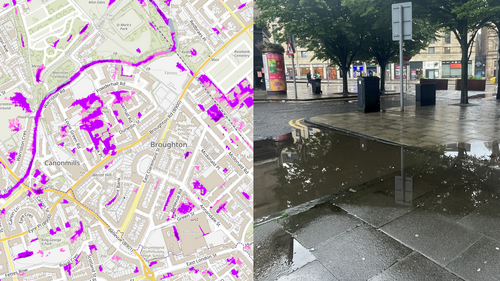Fighting for better drainage for Leith Walk ward

With Edinburgh's rainfall increasing year-on-year, the Lib Dems are leading the charge for water management that puts equity at its heart.
On 27th June 2024, Leith Walk ward Councillor Jack Caldwell and Inverleith Councillor Hal Osler tabled an item to highight the discrepency between the Council's water management policies and execution.
The Lib Dem motion was accepted cross-party with amendments accepted from Labour, Green and Conservative parties in the City Chambers.
Speaking on the proposal, Councillor Jack Caldwell said "Floodwater doesn't care if it's damaging public or private property, or whether it's exacerbating existing inequalities. That's why the onus must be on us as a Council to not let imaginary boundary lines get in the way of fixing the problem.
"Many of the communities I represent, including Bonnington and Canonmills, have suffered from this in the past. We need to review how we're mitigating floods where possible. It's both an infrastructure and a social justice issue."
The initial motion's text read:
“Council
Recognises;
1) The Scottish Government’s ‘Water, Wastewater and Drainage’ policy (2003) banning the construction of new drains into Combined Sewers, and that new gullies can only typically be installed as part of wider works.
2) The Climate Crisis and Biodiversity crisis, the former of which has led to higher ‘exceedance events’ than in previous decades and can cause both accessibility issues for walkers and wheelers, and in serious cases cause both public and private infrastructure damage.
3) That the Planning department produces regular iterations of the ‘Edinburgh Street Design Guidance’, the last revision of which predates National Planning Framework 4 (NPF4).
Affirms;
4) That alternative drainage and water capture systems on public land will be key to collecting rainwater.
5) Some alternative sustainable urban drainage and water capture systems, such as rain gardens, can also play a role in enhancing the biodiversity and nature of our city.
6) It’s essential that all five Place departments which may have a role to play (Gullys, Flood Prevention, Roads & Pavements, Greenspace, and Major Infrastructure Projects) are able to easily liaise and share appropriate resource to strengthen mitigations against more frequent exceedance events.
Requests;
7) A Report to Planning Committee in two cycles which outlines;
a) The role of gullies alongside alternative drainage/water capture systems in future revisions of the Edinburgh Street Design Guidance advisory notes and examples, if possible, where on the public realm this best practice has been utilised.
b) What ongoing steps the Planning Department and the Council as a whole are taking to liaise with SEPA, Scottish Water and the Scottish government to ensure every community in the city can be treated equitably against flooding on both private and public surfaces.
c) What steps the Planning Department take and could take to liaise with other Council Place departments (such as listed in Point 6) to ensure public realm infrastructure projects can also meet NPF4 Policy 22 and LDP 18 and 43 as best practice, as well as 2020 Edinburgh Street Design Guidance Section 3.1.
d) How Section 75 contributions (specifically) have traditionally been leveraged to mitigate flooding and enhance local biodiversity using drainage systems and blue-green infrastructure on public spaces.
8) This report is subsequently referred to Governance, Risk and Best Value Committee for cross-departmental risk resilience scrutiny.”
